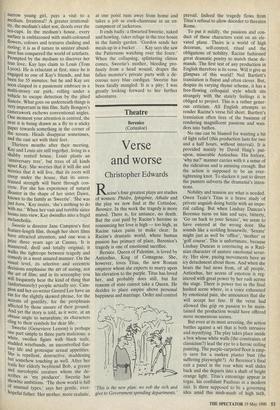Cinema
Sweetie ('15', Metro)
Natural disaster
Hilary Mantel
Think of an Australian suburb. Think of Neighbours. Think of Neighbours on crack. Even then, you will have only a slight idea of what Sweetie is like.
Kay (Karen Colston) a pale, nun-like, narrow young girl, pays a visit to a medium. Irrational? A greater irrational- ity, the medium's idiot son, drools over the tea-cups. In the medium's house, every surface is emblazoned with multi-coloured flowers, colours and textures clashing and rioting; it is as if nature in sinister abund- ance has conquered the world of artefacts. Prompted by the Medium to discover her true love, Kay lays claim to Louis (Tom Lycos). He is reluctant at first, since he is engaged to one of Kay's friends, and has been for 55 minutes; but he and Kay are soon clasped in a passionate embrace in a multi-storey car park, rolling under a vehicle to escape detection by the jilted fiancée. What goes on underneath things is very important in this film. Sally Bongers's camerawork eschews conventional angles. One moment your attention is centred, the next it is being drawn as a fly to a sticky paper towards something in the corner of the screen. Heads disappear sometimes, and the cast act with their feet.
Thirteen months after their meeting, Kay and Louis are still together, living in a shabby rented house. Louis plants an anniversary tree', but trees of all kinds upset Kay. She worries that it will die and worries that it will live, that its roots will creep under the house, that its unres- trained strength will burst through con- crete. For she has experience of natural disaster in the shape of her sister Dawn, known to the family as 'Sweetie'. 'She was Just born,' Kay insists, 'she's nothing to do with me.' When her vast and terrible sister looms into view, Kay dwindles into a frigid melancholia.
Sweetie is director Jane Campion's first feature-length film, though her short films have attracted attention, and one won a Prize three years ago at Cannes. It is mannered, droll and totally original; it walks the tightrope between tragedy and comedy in a most assured manner. On the visual level, its selective and eccentric decisions emphasise the art of seeing, not the art of film; and in its screenplay you will frequently hear the kind of thing that (unfortunately) people actually say. Cam- Pion and her co-writer Gerard Lee have an ear for the slightly skewed phrase, for the accents of gentility, for the periphrasis affected by those unsure of their ground. And yet the story is told, as it were, at an obtuse angle to naturalism; its characters cling to their symbols for dear life. Sweetie (Genevieve Lemon) is perhaps one part simple to three parts malicious: a white, swollen figure with black nails, studded wristbands, an uncontrolled fan- tasy life and grotesque sexual appetities. She is repellent, destructive, maddening but somehow touching as well. After her trails her elderly boyfriend Bob, a greasy and narcoleptic creature whom she de- scribes as 'my producer'. Sweetie has showbiz ambitions. 'The show world is full of unusual types,' says her gentle, ever- hopeful father. Her mother, more realistic, at one point runs away from home and takes a job as cook-chanteuse in an en- campment of jackeroos.
It ends badly: a thwarted Sweetie, naked and howling, takes refuge in the tree house in the family garden. 'Gordon sends her meals up in a bucket . . . Kay says she saw the Pattersons watching over the fence.' When the collapsing, splintering climax comes, Sweetie's mother, bleeding pro- fusely from a head wound, drapes the fallen monster's private parts with a de- corous navy blue cardigan. Sweetie has been fatally mangled. It is a pity; I was greatly looking forward to her further adventures.



































































 Previous page
Previous page